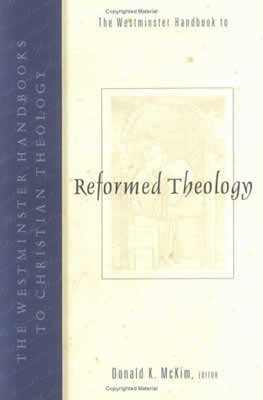GENERAL THEOLOGY The Westminster Handbook to Reformed Theology edited by Donald K. McKim (Louisville, Kentucky: Westminster John Knox Press, 2001). Donald McKim is the author of a 2001 volume on the biblical basis, historical development, and contemporary significance of Reformed theology and the editor of a recent abridgment of Calvin’s Institutes as well as the Encyclopedia of the Reformed Faith. This “handbook” is a joint effort with contributions from a broad range of over 100 scholars with an interest or speciality in Reformed theology. In the preface, McKim writes of “the Reformed family of Christian believers”; the range of contributors with their different approaches and perspectives on Reformed theology shows this to be quite a divergent and extended family. Some articles in this double-columned dictionary trace the trajectory of Reformed thought on a subject from Calvin through the Reformed Scholastics, the Puritans, and Old Princeton; others follow through the line of descent from Calvin to Schleiermacher to Barth; some move straight from Calvin to contemporary (that is, North American, Presbyterian) church documents and concerns; others offer a systematic theological outline of a particular doctrine beginning with the Bible. Occasionally articles consist primarily of unanalysed lists of dates, books, and authors, with unnecessary detail (e.g. “Hymnody”and “Resistance, Right of”). Many contributors are internationally recognised experts in their respective fields. Short bibliographies are attached to the end of most articles, but these are very often frustrating: many appear quite dated, many contain several foreign language and difficult to obtain items thus making them quite specialised, many omit important works, and for no apparent reason some articles (e.g. on “Hell”, “Salvation”, and “World Religions”) have no bibliography at all (while the extra calvinisticum, for instance, gets seven titles!). Cross references to other articles appear in bold throughout the book, although inconsistently (e.g. sometimes a word is bold simply because it is the title of another article and not because that article has any real relevance to the discussion at hand). There are some interesting disagreements between contributors, my favourite being where the article on Calvinism claims that Calvin himself didn’t believe in limited atonement, yet goes on to define his position in exactly the same way as the article on the Synod of Dort describes limited atonement! Strangely, limited atonement (perhaps the most controversial of the famous five points of Calvinism) does not have an entry of its own, and I would have liked to see an article on Amyraldianism too (since Amyraut himself is mentioned several times). If that sounds picky, bear in mind that other seemingly obscure topics did qualify for entries (e.g. finitum non capax infiniti, the Leiden Synopsis, the King’s Confession). Understandably, given the probable constraints of space, individual Reformed theologians are not treated separately, although Augustine rightly has a page to himself. Perhaps I missed it, but there does not seem to be any acknowledgement throughout this book that there is such a thing as a Reformed Baptist (the article on baptism certainly assumes that paedobaptism is the norm in Reformed circles). The bias towards the USA is clear on almost every page, which is a shame for those of us on the other side of the pond: the article on the Half-Way Covenant is very interesting but what about The Great Ejection of 1662, which was surely one of the most significant moments in the history of English-speaking Christians of a Reformed stamp? Naturally one could quibble with this or that in other articles (I was surprised to find Holy Spirit referred to as an “it” in the article on him for instance, and regularly disappointed by the abundance of Barthian reinterpretations). Overall, this volume is variable in quality and usefulness depending upon the author of the particular article being consulted, and often leaves one wondering just how wide the “Reformed family” should be taken to be. If Schleiermacher, despite being the father of Liberal Protestantism, counts as a Reformed theologian, why not Arminius who, after all, considered himself Reformed? This review was first published in Themelios 29.1 (2003). |
